Amanda Moser Arkans
aarkans@rockhillmennonites.org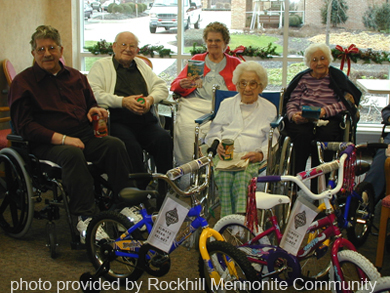
In 1539, Menno Simons said: “True evangelical faith cannot lie dormant, it clothes the naked, it feeds the hungry, it comforts the sorrowful, it shelters the destitute, it serves those that harm it, it binds up that which is wounded, it has become all things to all men.â€
At Rockhill Mennonite Community we attempt to express true evangelical faith as the residents in all levels of care are encouraged to live these words of Menno Simons.
Residents in the Healthcare Center may require 24 hour nursing care, but that does not stop them from exercising this kind of faith. Each month, the residents run a “Cookie Monster Sale†making homemade cookies and selling them to staff and their fellow residents. This money is then given to their Resident Council that decides how the money is divided.In the past, monies have been given to Mennonite Central Committee for use in disaster relief. Locally, the Resident Council supports the Sellersville Fire Department. They also provides bikes and helmets to Pennridge FISH (Fellowship In Serving Humanity), a non-profit organization that serves the needs of the low income families in the Pennridge School District, during the Christmas season.
But the Healthcare resident committee does not stop there. They also support their own, providing electric door openers to different areas of Rockhill to make all areas more accessible to the residents. In addition, they are sure to thank those that support them, by making handmade thank-you gifts for their caregivers during National Nursing Home Week. The Healthcare unit is active in many other areas of service that keep everyone’s evangelical faith from growing dormant while at Rockhill.
Our Healthcare residents are not the only ones who are busy living out this faith. Independent Living residents run a convenience store on-site, called Josey’s Store. Josey’s not only gives the residents the convenience of grocery shopping within the community but the profits from the store are used to support service projects at Rockhill and around the world. Many Independent Living residents are pending their retirement as volunteers with local organizations like the Care and Share in Souderton and Grand View Hospital. And not to be forgotten, the Assisted Living residents recently raised money for the Pennridge FISH “Bear†project.
Even the participants in the Adult Day Care Center express this faith by celebrating Christmas twice each year. Adult Day Services holds two food and dried goods drives for Indian Valley Opportunity Center, one in December and one as part of a Christmas in July celebration. They also make bookmarks a few times a year for patients at Grandview Hospital.
Sunday morning worship brings together residents from the entire community. The first Sunday of every month an offering is taken for a different charity. For instance, in February the offering went to support the Global Family Program of MCC. In a setting like this it is possible for our world to become rather small. These opportunities to support ministries near and far help expand our horizons and push us to keep in focus a world bigger than RMC.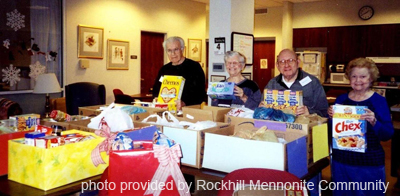
Rockhill Mennonite Community relies on the aid of volunteers acting on these words of Menno Simons. Without the help of volunteers, Rockhill would not be able to continue to offer the broad spectrum of activities and events that its residents enjoy. Anyone interested in volunteering is urged to call Mary Bleakly at (215) 257-2751.

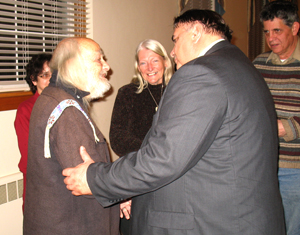 A columnist in the Allentown Morning-Call suggested that Mennonites (along with Quakers, Buddhists and Unitarians) might be able to solve the problems of the world when he heard about our congregation’s efforts. It’s definitely true that the “Shelter for Life†initiative has begun to transform our church at Deep Run East. Through “Shelter for Lifeâ€, we decided to build a house for an elderly couple who had lost their home to Hurricane Katrina. The house is being built in Pennsylvania in sections and will be taken to Louisiana by truck. There was a good buzz of excitement as the builders were trying to read the difficult blueprints.And we had questions. Would the truck drivers be able to navigate the small bridge that needed to be crossed to get to the building site? With some photos and calculations by an engineer from our congregation the good news was that they would not need to unload the tractor trailer on one side of the bridge and reload it on the other.As part of our building and connecting efforts we invited Gulf States Mennonite Conference leader Steve Cheramie-Risingsun to speak during a weekend event at Deep Run East. Steve is a Native American of the Chinamache tribe and a Mennonite pastor. He ministers with two Native American Mennonite congregations that are four hours apart, one in Alabama and the otherin Louisiana. He is a great storyteller and humble servant of God. Steve, his grown children, his mother and siblings also lost all their material possessions to Hurricane Katrina but he does not talk about his own hardships. His priority is to help others.
A columnist in the Allentown Morning-Call suggested that Mennonites (along with Quakers, Buddhists and Unitarians) might be able to solve the problems of the world when he heard about our congregation’s efforts. It’s definitely true that the “Shelter for Life†initiative has begun to transform our church at Deep Run East. Through “Shelter for Lifeâ€, we decided to build a house for an elderly couple who had lost their home to Hurricane Katrina. The house is being built in Pennsylvania in sections and will be taken to Louisiana by truck. There was a good buzz of excitement as the builders were trying to read the difficult blueprints.And we had questions. Would the truck drivers be able to navigate the small bridge that needed to be crossed to get to the building site? With some photos and calculations by an engineer from our congregation the good news was that they would not need to unload the tractor trailer on one side of the bridge and reload it on the other.As part of our building and connecting efforts we invited Gulf States Mennonite Conference leader Steve Cheramie-Risingsun to speak during a weekend event at Deep Run East. Steve is a Native American of the Chinamache tribe and a Mennonite pastor. He ministers with two Native American Mennonite congregations that are four hours apart, one in Alabama and the otherin Louisiana. He is a great storyteller and humble servant of God. Steve, his grown children, his mother and siblings also lost all their material possessions to Hurricane Katrina but he does not talk about his own hardships. His priority is to help others.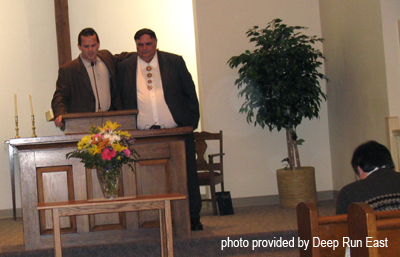 There was an overwhelming response from the congregation and community along with gracious articles in the Allentown Morning-Call. During Saturday evening donations were collected from congregational members, the personal contacts from the congregation’s “Shelter for Life†committee with local businesses, and broader community response and as a result the house is now paid for, around $53,000!
There was an overwhelming response from the congregation and community along with gracious articles in the Allentown Morning-Call. During Saturday evening donations were collected from congregational members, the personal contacts from the congregation’s “Shelter for Life†committee with local businesses, and broader community response and as a result the house is now paid for, around $53,000!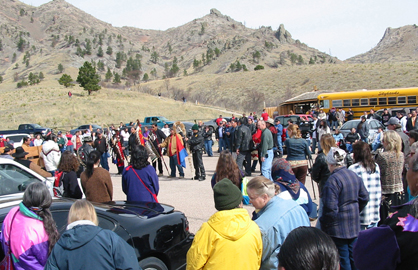
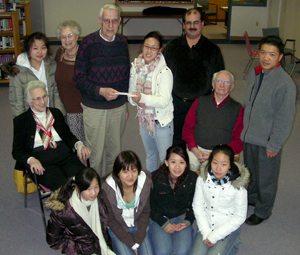 Elizabeth Stover and her husband Preston who live at Dock Woods Community were out walking on the path in the woods connected to the retirement community. Coming toward them was a young man with his small playful child hanging on to his legs. Insoo Lee introduced himself and said he was the youth pastor of a nearby Korean church. Elizabeth invited Insoo’s family to her home for dinner and to speak with the prayer group that she leads at Dock Community.
Elizabeth Stover and her husband Preston who live at Dock Woods Community were out walking on the path in the woods connected to the retirement community. Coming toward them was a young man with his small playful child hanging on to his legs. Insoo Lee introduced himself and said he was the youth pastor of a nearby Korean church. Elizabeth invited Insoo’s family to her home for dinner and to speak with the prayer group that she leads at Dock Community. 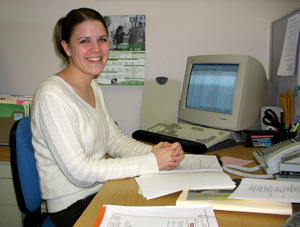 “What do you want to be when you grow up?†For generations, adults have asked children this familiar question and I never had a very good answer. For awhile, my quick response was “teacher†because at eight years old I liked to play “school†with my younger sister. But as I grew, I realized I really didn’t know.
“What do you want to be when you grow up?†For generations, adults have asked children this familiar question and I never had a very good answer. For awhile, my quick response was “teacher†because at eight years old I liked to play “school†with my younger sister. But as I grew, I realized I really didn’t know. 

 The flood surprised me as much as anyone who was there to witness it; the river of tears, the enormous emotional tidal wave that washed over me. It was seven years ago now, at the healing service at the Mennonite Youth Convention in St. Louis. The theme was “Come to the River,†and come to the river, I did. More accurately, perhaps it came to me.
The flood surprised me as much as anyone who was there to witness it; the river of tears, the enormous emotional tidal wave that washed over me. It was seven years ago now, at the healing service at the Mennonite Youth Convention in St. Louis. The theme was “Come to the River,†and come to the river, I did. More accurately, perhaps it came to me.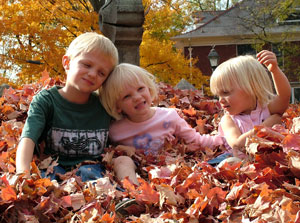 The LORD is my rock, my fortress and my deliverer; my
The LORD is my rock, my fortress and my deliverer; my